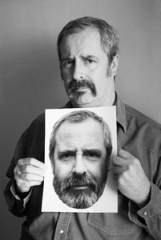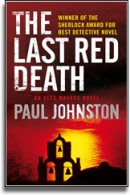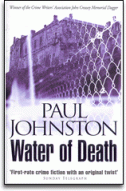 I first met Paul Johnston when I was living in Athens; 2004 I think it was, in the afterglow of the Olympic Games when I was rounding up local celebs to interview on Athens International Radio.
I first met Paul Johnston when I was living in Athens; 2004 I think it was, in the afterglow of the Olympic Games when I was rounding up local celebs to interview on Athens International Radio.
Paul was, and still very much is, a crime writer; hence a local celeb. I called him up on some pretext or other that would allow us to probe into his long-standing relationship with Greece.
He was to become a regular on the show; a couple of years later in 2006 he may have upset some of the local clergy when we discussed the row over the Da Vinci Code – the film was making waves among the church goers in Greece while the literary types were more appalled at the notion of the wooden Dan Brown style selling 40 million copies.
Paul was slightly taciturn, to the point and totally dismissive of those who expected hell and damnation to rain down on the shoulders of anyone who stepped inside a cinema.
“Don’t they realise it sells in the fiction aisles, not theology? I just wish one of my books could sell 40 million copies,” was the gist of his response.
After our first conversation we quickly discovered we had a common interest in rugby – although as a Scotsman I wasn’t overly convinced he really knew what rugby was – and we arranged for a long lunch in a taverna just behind Adrianou in the Plaka area of Athens. Which is where I learnt about his battle with cancer.
The taverna, sadly, is gone now, boarded up, the family that ran it priced out by increasing rents at a time when the economy was shrinking.

Paul was delighted to inform me, though, that his fictional detective Alex Mavros “lived” just next door to where we were sat, his good friend the Fat Man within spitting distance.Paul chugged on a cold bottle of Kaiser as we waited for our lunch to appear, complete with tin jugs of cold white house wine.
“I don’t drink as much as I used to,” he told me between swallows. “Not since I had a kidney removed.”
This, needless to say, is something of a meal stopper, one of those lines you find crime writers leave dangling at the end of a chapter in order to make you flip the page and crack on with the next one.
I raised my apology of an eyebrow.
“Cancer,” he said by way of explanation.
Over the next five years, we drank a lot more. Paul got married and had a couple of children; he started writing a new series of novels featuring Matt Wells, tried to convince me that Andy Irvine was the greatest full-back in rugby history and, in the meantime, contracted a second bout of cancer, this time in his bowel.
That was in 2008.

I left Athens the following year; Paul also moved away from the city down to the Peloponnese. But he couldn’t shake off the cancer which returned in his prostate in 2011.For a third time he has been under the knife, losing more body parts in the process than Matt Wells could string on a washing line, undergoing the chemo and facing the same questions each time as to what the future holds.
Each time he has surfaced to fight and write again.
“I keep morale up by taking large amounts of drugs – all legal of course,” he says.
“I’ve been diagnosed as bipolar. I always had depressive tendencies, but it’s possible that the strain of living with all these cancers pushed me into the manic area.
“But I’m stable now as long as I can write, create. And make crap jokes. Oh, and listen to loud rock music.
“Because I write crime novels and thrillers, the body is a central concern. I haven’t yet worked out what the link is between my experiences of my body being sliced open and organs being removed, and my depictions of violence.”
Surprisingly, he is also able to point to a good aspect of having cancer.
“It helps you to understand the relationship between life and death better, though that probably comes with getting older too.

“And you find out which of your friends and relatives are up to coping and which are useless – actually, that isn’t entirely a good thing. And you find out more about yourself and your abilities – again, not entirely a good thing.”He also knows the cancer is unlikely to have given up on him.
“I know I’ll be having various tests for the rest of my life and I’m pretty sure I’ll get it again and it doesn’t particularly bother me. Oddly, fear hasn’t played a significant part in any of this.
“I’m not trying to make out that I’m some sort of hero. I just take it as it comes – and pay for it heavily with depression afterwards.
“In fact, if we are talking heroes, then really that is my wife Roula. She was the first to care, the one who got me into hospital on all three occasions, the one who kept the kids going – and had cancer herself in the middle of it. If anyone’s heroic, she’s your woman.
“One of the worst things is the injustice of it. Why should I have had cancer three times when most people I know haven’t even had it once?
“Then again, self pity is a waste of time. I cope by writing, that’s the only therapy that really works for me. And none of the cancers has killed me.”
At which point Paul raises two fingers, empties his glass and, with imaginary bagpipes scaring the pigeons, dances a small jig.
Paul claims not to be a hero but to those of us who have never had the misfortune to have a tussle with cancer, he is. Not just because he has been through it and come through the other side but because he has never allowed it to rule his life and affect his literary output.
In his own words, now, Paul describes the journey through three bouts of cancer.
 THE FIRST DIAGNOSIS: 2003 KIDNEY
THE FIRST DIAGNOSIS: 2003 KIDNEY
“I had an on and off pulling pain in my left upper groin for some time.
“I first went to the GP in 1998 and was told it was muscular – being an ex-rugby player I was obviously particularly well endowed with muscles.
“When it persisted, I was eventually sent to the Urology Dept at an Edinburgh hospital. They did various tests, including an ultrasound, and found, er, zilch. I kept going back to the GP and he finally referred me to a general surgeon, that is one who knows a little about a lot. He recommended attendance at a pain clinic. I’m not making this up, I promise.
“Two months later I was going under the knife at a hospital in Athens, thanks to my future wife refusing to accept that there wasn’t something seriously wrong.
“The Greek surgeons discovered that the whole of the left side of my urinary tract was blocked about two hours after I entered the hospital. ‘Where has he been living? they asked. ‘In a third world country?’ So much for Edinburgh’s eminent medical history.
“There was very little time between diagnosis and op in Athens, and the word cancer was avoided, though I knew that’s what it was. Besides, you go into fight mode before surgery. It’s afterwards that the psychological shit starts to fly.
“Ten days later, after certain tests that I should have had under the NHS, I had a nine-hour operation. I lost a kidney and my left ureter from transitional cell carcinoma. It was very advanced and highly aggressive, so I was very lucky they got it when they did.
“Basically they removed everything above my bladder on the left side and also sewed up the concomitant hole in the latter organ. The removal of my catheter on the day I was released was a joy.”
“Surprisingly, since I was a full blown Scots boozer, alcohol had nothing to do with it.
“Two weeks later I was prancing around the Acropolis with an Irish mate who’d come to visit. Then came the chemotherapy which I did in Edinburgh, rather than face the heat of Athens.
“Four monthly cycles of one night in hospital having gallons of poison pumped in, then two more sessions once a week. Then a week ‘off’ when you feel even worse because the full amount of drugs are in your system.
“I didn’t lose my hair (it did thin out a bit) but I was very pale and nauseous. Some of my friends thought I was a goner…”
“I tried to start writing when I was doing chemo, which didn’t work. But I wrote a novel before a year was up from the op, so it didn’t hit me badly in that period.”
“Five years is the standard time before anyone is cleared of cancer. That day duly passed in 2008 but the pleasure did not last long.
“I had increasingly bad exhaustion and anaemia. I also had a tennis-ball sized lump in my lower abdomen. Guess what? It wasn’t noticed on the last CT scan I had in Edinburgh. So they blew it twice.
“The time between diagnosis and op was again pretty short. I went into fight mode immediately. It was much worse for my wife, who had to watch all that happening without being able to do much, plus still nursing our three-month old son.
“They removed the said tennis ball and over a foot of my large intestine, plus my appendix. I was in hospital for 11 days again. To my astonishment, my bowel started working again after a few days. The human body is a truly remarkable, if traitorous, organism.
“Chemo this time was six months. I just had one intravenous dose per month and pills for the rest of the time. I was never officially signed off as I got another one…”
“In the meantime, I discovered that I have a rare genetic condition that makes me more likely to have cancers that are otherwise unconnected, which none of mine are.
“My close family all had to be tested but are all clear. Unfortunately there’s a 50 percent chance that my kids could have the gene, but we won’t know that till they’re 18. Still, knowledge is power.”
“In 2011 I got the news again that I was under attack, this time in the prostate.
“I think my mood was more resignation than any thing else; I certainly wasn’t surprised.
“Fortunately, because of regular testing (essential because of my genetic issue), the cancer wasn’t far advanced, though it was mega-aggressive and had taken over a quarter of my prostate.
“Like the bowel one, it was heading for other organs, but we got it just before it made the breakout.
“I had to have anther op. And I was in hospital for, guess what, 11 days – just like the other two.
“A bonus was that the wound from the particular prostatectomy that I had doesn’t hurt much. So I was up and about after a couple of days. I had to go home with the catheter for ten days, which wasn’t much fun, especially when I caught the tube on things. That really did make the eyes water.
“Fortunately the prognosis is good so I didn’t have to have radiotherapy. So in some ways this was the easiest of the three. Then again, the side effects are a serious bummer. Pampers, anyone? At least I got out of those after a month.
“I haven’t been given the all-clear yet. And I know I’ll be having various tests for the rest of my life.”
 Barney Spender is currently raising money for Cancer Research by going on the wagon for the whole of January. It is hurting him a lot more than training he underwent for the London and Athens marathons a decade ago when he was still young(ish) and had a spring in his step. You can sponsor his Dryathlon effort by clicking on the link.
Barney Spender is currently raising money for Cancer Research by going on the wagon for the whole of January. It is hurting him a lot more than training he underwent for the London and Athens marathons a decade ago when he was still young(ish) and had a spring in his step. You can sponsor his Dryathlon effort by clicking on the link.
©Barney Spender/Paul Johnston 2013

